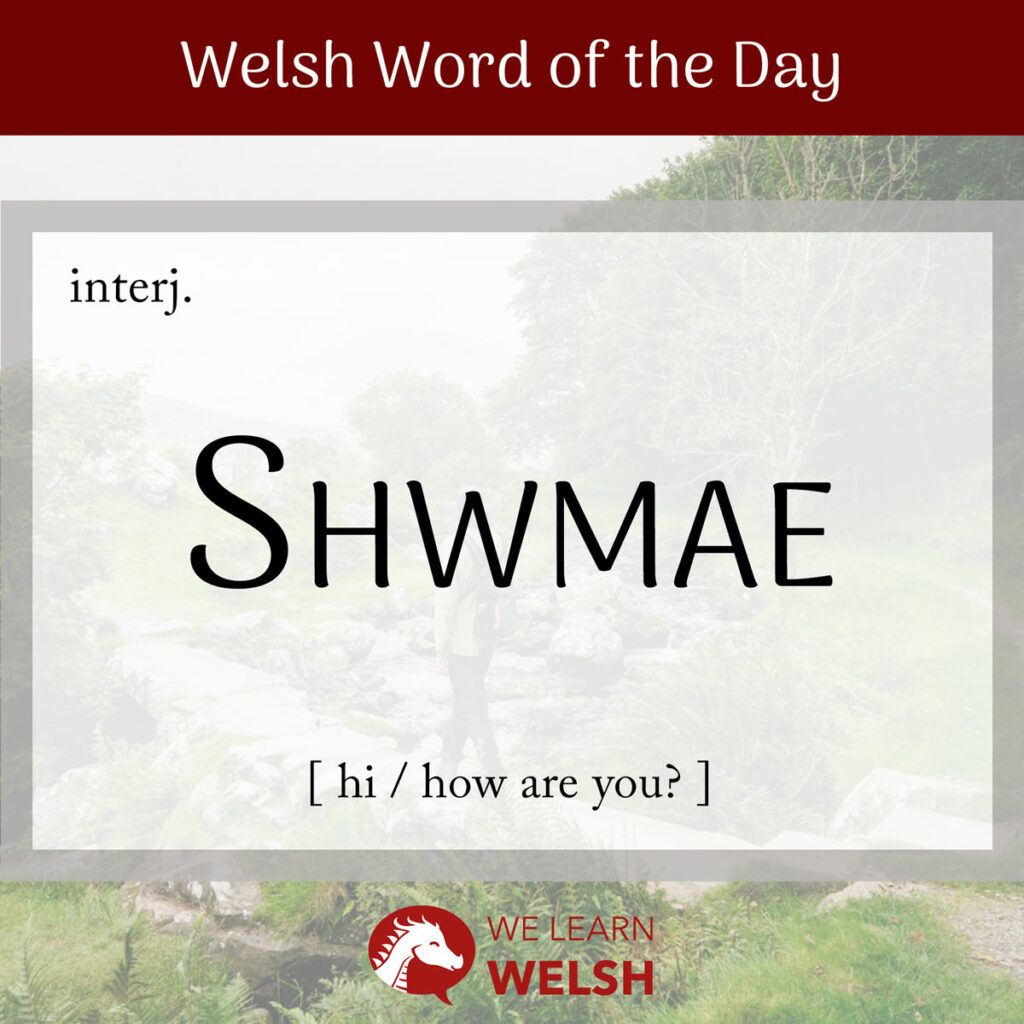If you asked ten people what they think the most important gair (word) to learn in a new iaith (language) is, there’s not a bad chance you’d get ten different answers!
Personally, I’m in the diolch (thank you) camp. It’s one that you need to say in almost every single conversation, especially if you’re exploring a new country. But some people would instead insist on another courtesy like os gwelwch yn dda (please), something practical like bwyd (food), or of course the all-important tŷ bach (toilet).
All this being said, one of the best options has got to be shwmae (hello / how are you), or the Northern equivalent su’mae. It’s a three-in-one – a greeting, a way of showing respect and interest, and an invitation for the conversation to go further.
shwmae
hi / how are you
su’mae
hi / how are you
I’ve only given pronunciations above of the two most common variants, but you will almost certainly also hear s’mae and sut mae in the North and sh’mae, shwt mae, or even shwdi in the South.
Shwmae and su’mae are contractions of the longer and more formal phrase sut mae hi (how is it)? Here, sut means how, mae is the existential verb in Welsh meaning is or there is, and hi is usually she or her but is also used to mean it when we’re talking about very abstract concepts like tywydd (weather) or amser (time).
Su’mae on first glance seems like a more logical contraction, as it retains more of the sound of sut. The reason that shwmae looks this way is simply because Southerners often pronounce sut with a sh rather than a s sound, and with an oo rather than an i as the central vowel.
I’ll note as well that the spelling sh for the sound sh is unusual for Welsh, and for this reason you will sometimes see the spelling siwmae. The latter makes more sense phonetically because si is how we normally spell sh in Welsh but it’s also more confusing because it looks like it could be pronounced s-iw (s-ew) rather than the actual si-w (sh-oo).
Another spelling variant refers occurs at the end of the word – you’ll frequently see all variants ending in mai or ma’i rather than mae. This is in reference to the hi part of the original expression. It doesn’t matter much though, since it sounds the same either way.
The word is sometimes paired with ers tro or ers talwm (since a long while) if you haven’t seen someone for – you guessed it – a long time.
Su’mae pawb; dw i’n falch iawn o’ch cyfarfod.
Hello everybody; I’m very pleased to meet you.

What’s key to grasp about this phrase is that although it literally means how are things, for most people in Wales, it is the go-to greeting in the way that you’d use hello in English.
In fact many ieithoedd (languages) work in this way. The first thing you say to someone when you meet them has a specific meaning beyond just hello, rather than being a situationally unique and otherwise meaningless word. Think of the Mandarin nihao, literally meaning you good, or the Arabic salam alaikum, which wishes peace upon the listener.
That’s not to say that you can’t use separate words for hello and how are you. Although shwmae / su’mae is the most ubiquitous, it is absolutely not the only greeting you can use in Welsh. It’s just as easy to start a sgwrs (conversation) with:
- Helô! / Hylô! = Hello!
- Haia! = Hi! / Hiya!
- Bore da = Good morning
- Prynhawn da / P’nawn da = Good afternoon
- Ti’n iawn? = You alright?
- Sut hwyl? = How are things? (formal)
Personally, I open most conversations with haia or shwmae and then later on follow up with a more specific sut wyt ti? (how are you?)
Doing this ensures you’ll get an answer about how someone’s actually doing, as many people will just interpret shwmae as a simple greeting and respond with shwmae themselves rather than answering the cwestiwn (question)! That’s not to say shwmae can’t be used interrogatively because it absolutely can – but make it clear with your tone that you expect a proper response.
O haia Sioned! Shwmae te? Ti’n iawn?
Oh hiya Sioned! How are you then? You okay?
We even have a special diwrnod (day) to celebrate saying shwmae… and it’s today!
Diwrnod Shwmae Su’mae (Shwmae Su’mae Day) is held on the 15th of mis Hydref (October) yearly since 2013, and it’s intended to promote people using the Welsh language in everyday situations.
The idea is that on Diwrnod Shwmae Su’mae, you start every sgwrs you have in y Gymraeg (Welsh), whether you’re a new learner, a native speaker, or anywhere in between. Now it’s inevitable that you’ll sometimes have to switch back to English, but you may be surprised both by your own skill, and by how many other people you come across who do actually speak the language!
It’s really valuable because so many people in Wales, even those who speak the iaith fluently, feel the need to use in English in public settings or when starting new sgwrsiau (conversations).
When I was growing up in heavily English-speaking mid-Powys, I rarely started sgwrsiau (conversations) in Welsh unless I already knew the person I was speaking to, or I was at ysgol (school). But after going to prifysgol (university) in England I realised how much I missed speaking y Gymraeg everyday – and now whenever I’m home I make a point to use it as much as I can. Diwrnod Shw’mae Su’mae, for me, is just the latest great excuse!
Have you done anything to celebrate Diwrnod Shw’mae Su’mae?
If not, let’s have a virtual celebration – I challenge you to leave a comment in our Facebook group yn y Gymraeg (in Welsh), without being scared to make mistakes. Mistakes are how we learn, and by learning, you’re keeping the iaith alive.
Did you know that Heather met up with fellow Welsh learner Gisella in Turin, Italy to celebrate Diwrnod Shw’mae Su’mae back in 2019? You can read about her experience here!


